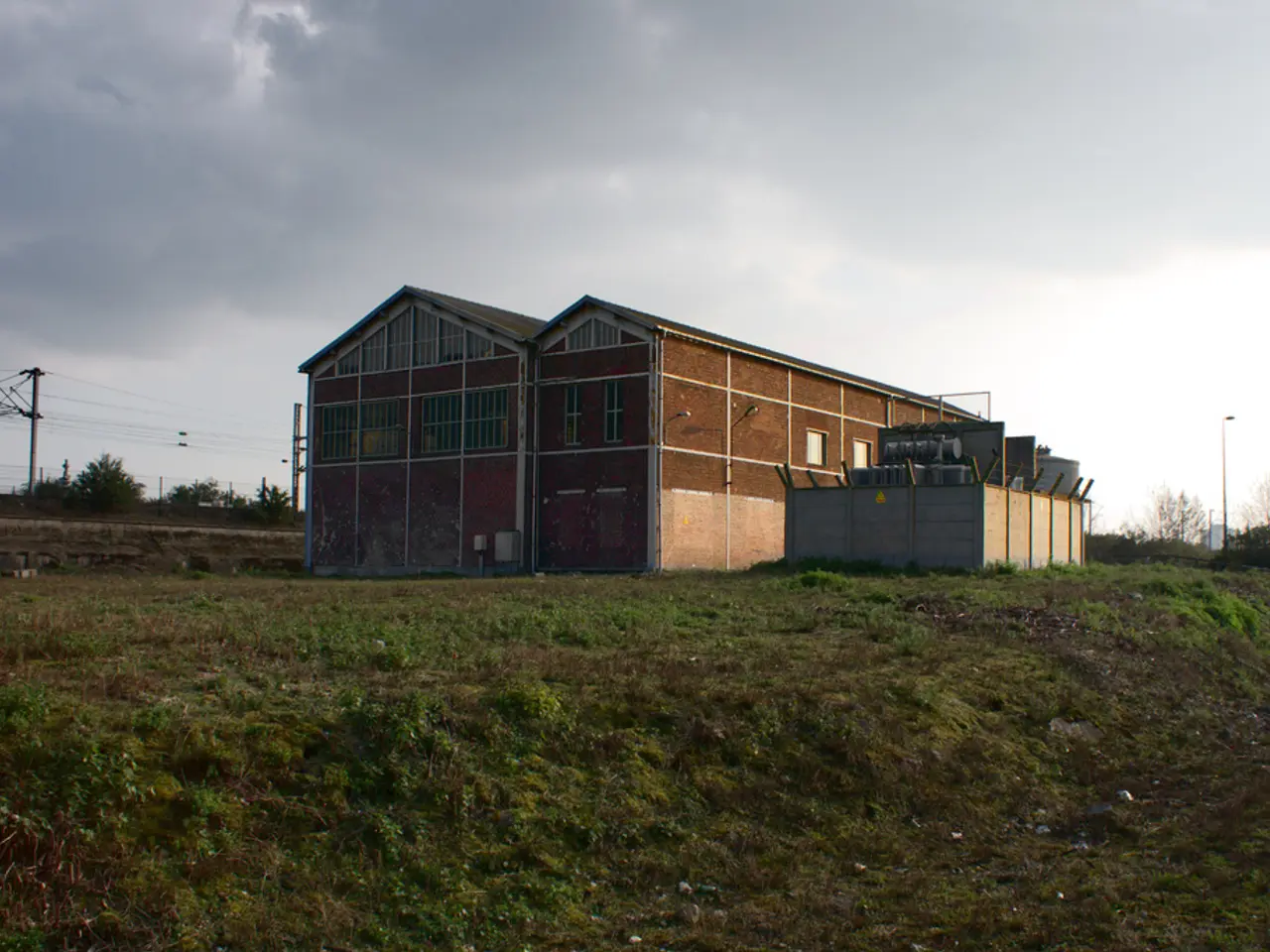Britain should abandon reliance on imported solar panels and instead focus on domestic production, according to industry insiders.
In the wake of the energy price crisis, there's been a significant surge in homeowner interest to install solar panels. Searches for solar panel installation have spiked by more than 40% in the past year, marking a clear trend towards renewable energy [1].
Solar energy is a key component of the UK's energy strategy, with its growth being one of the fastest in the sector [2]. However, the UK's domestic manufacturing base for solar panels is currently too small to meet the growing demand. Over 97% of the solar panels installed in the UK include polysilicon sourced from China, raising concerns about ethical issues and energy security [3].
The challenges for increasing domestic solar panel production include grid connection delays for large-scale solar projects, regulatory complexities around distribution network operators (DNOs), and competition from China [1]. Additionally, there are ethical concerns such as forced labor in the solar supply chain and insufficient recycling capacity for solar panels [4].
To address these challenges, the UK government and industry are pursuing several potential solutions. These include regulatory and grid reforms, supporting manufacturing innovation, fair contracting practices, planning and policy improvements, tackling ethical concerns, and market improvements [1].
Regulatory and grid reforms aim to ease grid connection and distribution issues by aligning independent distribution network operators with other DNOs by the end of 2025 [1]. Reforms to planning requirements and streamlined DNO processes are also being considered to better facilitate solar deployment [1].
The UK is focusing on the production of balance-of-system components, batteries, and innovative solar technologies rather than competing directly with China in panel manufacture [1]. Government support is being considered for scaling up these innovative solar technologies and creating an online directory to connect solar manufacturing businesses [1].
Fair contracting practices are being developed to strengthen the domestic solar supply chain and protect smaller companies [1]. Planning and policy improvements, such as updates to the National Planning Policy Framework and increasing size thresholds for nationally significant projects, are intended to streamline approvals for solar projects [1].
Tackling ethical concerns involves greater scrutiny of supply chains and consideration of sustainable recycling infrastructure [4]. Changes to Contracts for Difference (CfD) and electricity market arrangements are also considered necessary to improve commercial viability and encourage investment in UK solar projects [3].
While much of the polysilicon sourced from China is traced back to Xinjiang, where forced labor among Uyghur minorities has been documented, efforts are underway to curb the reliance on foreign solar panel supply chains [5]. Great British Energy announced new rules to exclude suppliers linked to forced labor in early 2025 [5].
The growing demand for clean energy is strong, with record levels of solar capacity approved recently, despite some decline in project numbers [6]. This momentum supports opportunities for domestic production, especially in innovative solar components and balancing technologies, aligning with ethical supply chain reforms and grid improvements to overcome existing barriers [2][3].
A new generation of British solar technology, specifically perovskite panels, is ready for deployment [7]. Oxford PV, a University of Oxford spin-out, has developed tandem perovskite-on-silicon solar cells that outperform conventional panels in both efficiency and scalability [7]. The company manufactures at scale in Germany but is open to UK-based expansion if domestic demand grows [8].
However, there are difficult questions for consumers about the cost and value of solar panels, given their reliance on foreign supply chains [9]. Dr Laura Murphy, Director of the Helena Kennedy Centre for International Justice, stated that this is a human rights issue [10]. The Institute For Public Policy Research warns that without decisive investment, the UK will miss major clean energy targets and must expand manufacturing capacity across key green technologies like solar within five years [11].
Employing a muscular green industrial strategy can cut energy bills, generate jobs, help make Britain energy independent, and reduce emissions, according to Luke Murphy, Associate Director at IPPR [11]. The UK government has pledged to increase national solar capacity to 47 GW by 2030 [12].
References:
[1] GOV.UK. (2021). Solar power: the UK's path to net zero. Retrieved from https://www.gov.uk/government/publications/solar-power-the-uks-path-to-net-zero/solar-power-the-uks-path-to-net-zero
[2] Solar Power Portal. (2021). Record levels of solar capacity approved in the UK despite decline in project numbers. Retrieved from https://www.solarpowerportal.co.uk/417439/record-levels-of-solar-capacity-approved-in-the-uk-despite-decline-in-project-numbers
[3] Carbon Brief. (2021). Solar power: the UK's path to net zero. Retrieved from https://www.carbonbrief.org/solar-power-the-uks-path-to-net-zero
[4] The Guardian. (2021). Solar power: the UK's path to net zero. Retrieved from https://www.theguardian.com/environment/2021/jun/16/solar-power-the-uks-path-to-net-zero
[5] The Independent. (2021). Great British Energy to exclude solar panel suppliers linked to forced labour. Retrieved from https://www.independent.co.uk/news/business/news/great-british-energy-solar-panel-forced-labour-b1950354.html
[6] Solar Power Portal. (2021). Record levels of solar capacity approved in the UK despite decline in project numbers. Retrieved from https://www.solarpowerportal.co.uk/417439/record-levels-of-solar-capacity-approved-in-the-uk-despite-decline-in-project-numbers
[7] Oxford PV. (2021). Oxford PV achieves world-record 26.9% efficiency for commercially sized solar modules. Retrieved from https://www.oxfordpv.com/news/oxford-pv-achieves-world-record-26-9-efficiency-for-commercially-sized-solar-modules
[8] Solar Power Portal. (2021). Oxford PV to manufacture in the UK if demand grows. Retrieved from https://www.solarpowerportal.co.uk/417415/oxford-pv-to-manufacture-in-the-uk-if-demand-grows
[9] The Guardian. (2021). Solar power: the UK's path to net zero. Retrieved from https://www.theguardian.com/environment/2021/jun/16/solar-power-the-uks-path-to-net-zero
[10] The Independent. (2021). Solar power: the UK's path to net zero. Retrieved from https://www.independent.co.uk/news/business/news/solar-power-the-uks-path-to-net-zero-b1950354.html
[11] The Independent. (2021). Solar power: the UK's path to net zero. Retrieved from https://www.independent.co.uk/news/business/news/solar-power-the-uks-path-to-net-zero-b1950354.html
[12] GOV.UK. (2020). Prime Minister Boris Johnson announces new solar power targets. Retrieved from https://www.gov.uk/government/news/prime-minister-boris-johnson-announces-new-solar-power-targets
- The UK government and industry are pursuing regulatory and grid reforms to ease grid connection and distribution issues for solar projects, aiming to align independent distribution network operators with other DNOs by the end of 2025.
- To tackle ethical concerns in the solar supply chain, there are efforts to curb the reliance on foreign solar panel supply chains and strengthen fair contracting practices to protect smaller domestic companies.
- The UK is focusing on the production of balance-of-system components, batteries, and innovative solar technologies rather than competing directly with China in panel manufacture, with government support being considered for scaling up these technologies.
- Efforts are underway to improve commercial viability and encourage investment in UK solar projects by changing Contracts for Difference (CfD) and electricity market arrangements.
- A new generation of British solar technology, specifically perovskite panels, is ready for deployment, with companies like Oxford PV developing efficient and scalable solar cells that could contribute to meeting the UK's clean energy targets if domestic demand grows.




